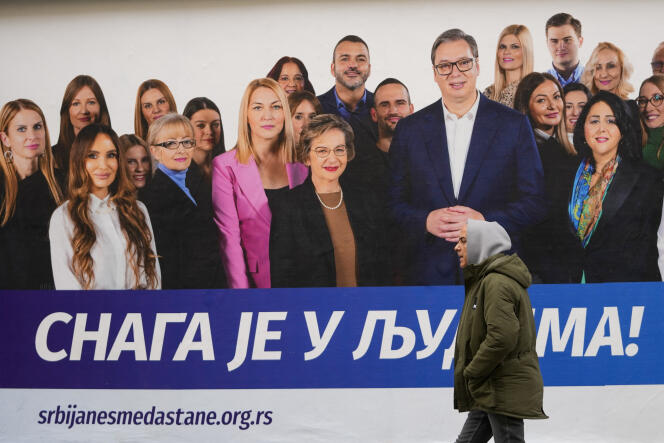President Aleksandar Vucic’s Serbian Progressive Party is likely to win parliamentary elections on 17 December, but the opposition has strong support in the capital, Belgrade – DW reports.
On Saturday in early December, hundreds of buses lined the wide streets of Novi Belgrade, one of the capital’s neighbourhoods, to attend the main election rally of the ruling Serbian Progressive Party (SNS).
“Of course I support Vucic. He gave us all money, most recently 10,000 dinars (€85/$94) for welfare recipients,” said one man sitting on a nearby bench, swigging from a beer can.
Election gifts are commonplace in Serbia: Vucic has decided to make one-off payments of 10,000 dinars from the state budget to pensioners, youth and the unemployed ahead of the parliamentary and local elections on 17 December. In addition, Vucic promised to raise pensions in January if his party wins the elections. The president himself is not running as he won a second term last year.
Belgrade weekly Vreme called Vucic a “beggar king”, saying he is making himself look like a man of the people who distributes money, builds roads and railways and creates jobs. On the other side, there is the opposition, which accuses Vucic of ruling Serbia with an iron fist and pitting the European Union, Russia and China against each other. The pro-European bloc Serbia Against Violence hopes to finish second behind SNS in the elections.
Vucic, however, does not see it that way. Here are Vucic’s words at a campaign rally at the Belgrade Arena:
Serbia is one of the few countries in Europe today that has an independent agenda.
There is a flip side: a young man told DW that he works in a hospital in a small town and that he was pressured to attend the rally. To keep his job, he and his colleagues were forced to attend the rally and vote SNS.
Hopes of the country joining the EU pre-election have dissipated, partly because the process has taken too long: “Putting the EU issue at the forefront would be political kamikaze,” Cvijic told DW. “All pro-government media outlets are spreading anti-Western vitriol. What good does it do the opposition to be pilloried for this, too?”
The main sticking point over the country’s EU accession is Kosovo, as Serbia does not recognise the independence of the former southern province despite pressure from Berlin and Brussels, while the 2013 Brussels Agreement requires Serbia to recognise Kosovo’s documents and stop blocking Kosovo’s path to UN membership.
Additionally, right-wing conservative and nationalist divisive parties, which make up the third key player in the elections, are campaigning exclusively on the Kosovo issue. They accuse Vucic of walking away from Kosovo by signing various agreements.
Nevertheless, Vucic’s biggest problems are related to the conflict between Russia and Ukraine, according to Belgrade historian and political scientist Stefan Radojkovic, as Serbia has one of the highest inflation rates in Europe due to high fuel prices, which undermines Vucic’s narrative of economic success. Moreover, the EU and the US wish to maintain control in the Balkans and force Serbia to compromise with Kosovo.
The elections will be a tense affair, especially in Belgrade. Polls show that the opposition could win in the capital, which would be seen as an important symbol.
